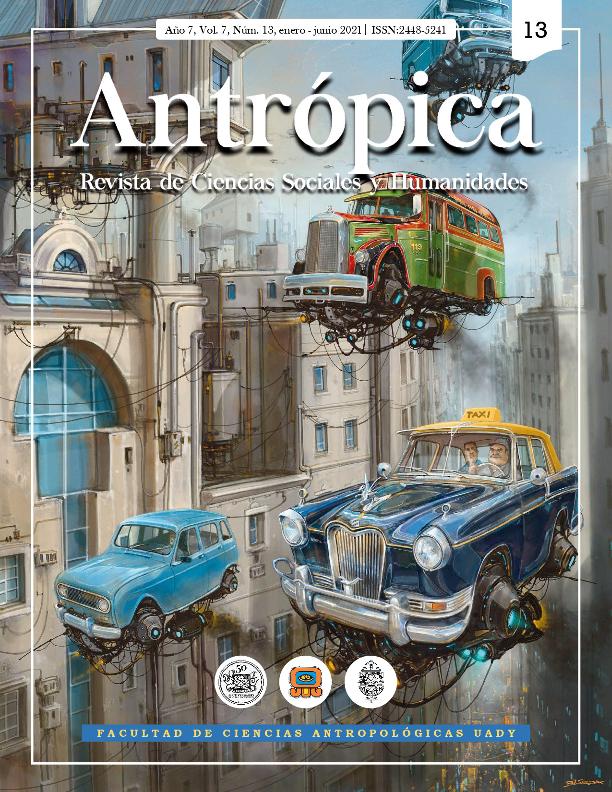Mostrar el registro sencillo del ítem
dc.contributor.author
Valiente, Silvia Carina

dc.date.available
2022-08-03T16:04:21Z
dc.date.issued
2021-01
dc.identifier.citation
Valiente, Silvia Carina; Pensar decolonialmente desde un lugar de enunciación no académico: Heridas coloniales que habitan cuerpos, espacios y tiempos heterogéneos; Universidad Autónoma de Yucatán. Facultad de Ciencias Antropológicas; Antrópica; 7; 13; 1-2021; 21-48
dc.identifier.issn
2448-5241
dc.identifier.uri
http://hdl.handle.net/11336/164064
dc.description.abstract
El objetivo principal de este trabajo es una invitación a pensar decolonialmente desde un lugar de enunciación no académico, como es la narrativa folklórica del canta-autor santiagueño Horacio Banegas. Desde un enfoque cualitativo, apoyado en el análisis narrativo propiamente dicho, observaremos como su obra habla de heridas coloniales que habitan cuerpos, espacios y tiempos heterogéneos. Entre los resultados anticipamos que el sujeto enunciador, en su decir y narrar, deja escapar un grito decolonial que emerge desde una experiencia concreta, desatando una pena de siglos. Ese grito desobediente habita, surcando por diferentes jerarquías de poder. El valor de este trabajo reside en mostrar cómo, desde los espacios de la vida cotidiana, se activa una producción de conocimientos, que habla de la geograficidad e historicidad del lugar. Finalmente, la investigación permite concluir que es pertinente y necesario contribuir al campo de la producción general del conocimiento en ciencias sociales desde lugares de enunciación no académicos, como el caso tratado, a modo de recuperar voces y memorias del territorio que han sido invisibilizados.
dc.description.abstract
The main purpose of this work is an invitation to think decolonially from a non academic enunciation place, such as the folklore narrative of the Santiago singer-writer Horacio Banegas. From a qualitative approach, based on the proper narrative analysis, we will consider the way his work speaks of colonial wounds that inhabit heterogeneous bodies, spaces and times. One of the results that can be brought forward is the fact that the enunciating subject, in his saying and telling, lets escape a decolonial shout which emerges from a concrete experience, unfastening a many-century-lasting pain. This disobedient scream inhabits furrowed by power hierarchies. The value of this work resides in the fact, that from the daily life spaces, it shows the way the production of knowledge is activated attending to the place geographical and historical perspectives. Finally, the research allows concluding that it is relevant and necessary to contribute to the field of the general production of knowledge in social sciences from non academic enunciation places, such as this case, in a way to recover voices and memories of the territory which have been turned into invisible entities.
dc.format
application/pdf
dc.language.iso
spa
dc.publisher
Universidad Autónoma de Yucatán. Facultad de Ciencias Antropológicas
dc.rights
info:eu-repo/semantics/openAccess
dc.rights.uri
https://creativecommons.org/licenses/by-nc-sa/2.5/ar/
dc.subject
Herida colonial
dc.subject
Narrativa
dc.subject
Lugar de enunciación
dc.subject
Pensamiento decolonial
dc.subject.classification
Ciencias Sociales Interdisciplinarias

dc.subject.classification
Otras Ciencias Sociales

dc.subject.classification
CIENCIAS SOCIALES

dc.title
Pensar decolonialmente desde un lugar de enunciación no académico: Heridas coloniales que habitan cuerpos, espacios y tiempos heterogéneos
dc.title
Thinking decolonially from a non-academic enunciation place: Colonial wounds that inhabit heterogeneous bodies, spaces and times
dc.type
info:eu-repo/semantics/article
dc.type
info:ar-repo/semantics/artículo
dc.type
info:eu-repo/semantics/publishedVersion
dc.date.updated
2022-08-01T13:40:22Z
dc.identifier.eissn
2448-5241
dc.journal.volume
7
dc.journal.number
13
dc.journal.pagination
21-48
dc.journal.pais
México

dc.journal.ciudad
Yucatán
dc.description.fil
Fil: Valiente, Silvia Carina. Consejo Nacional de Investigaciones Científicas y Técnicas. Centro de Investigaciones y Transferencia de Catamarca. Universidad Nacional de Catamarca. Centro de Investigaciones y Transferencia de Catamarca; Argentina
dc.journal.title
Antrópica
dc.relation.alternativeid
info:eu-repo/semantics/altIdentifier/url/https://antropica.com.mx/ojs2/index.php/AntropicaRCSH/article/view/260/
Archivos asociados
